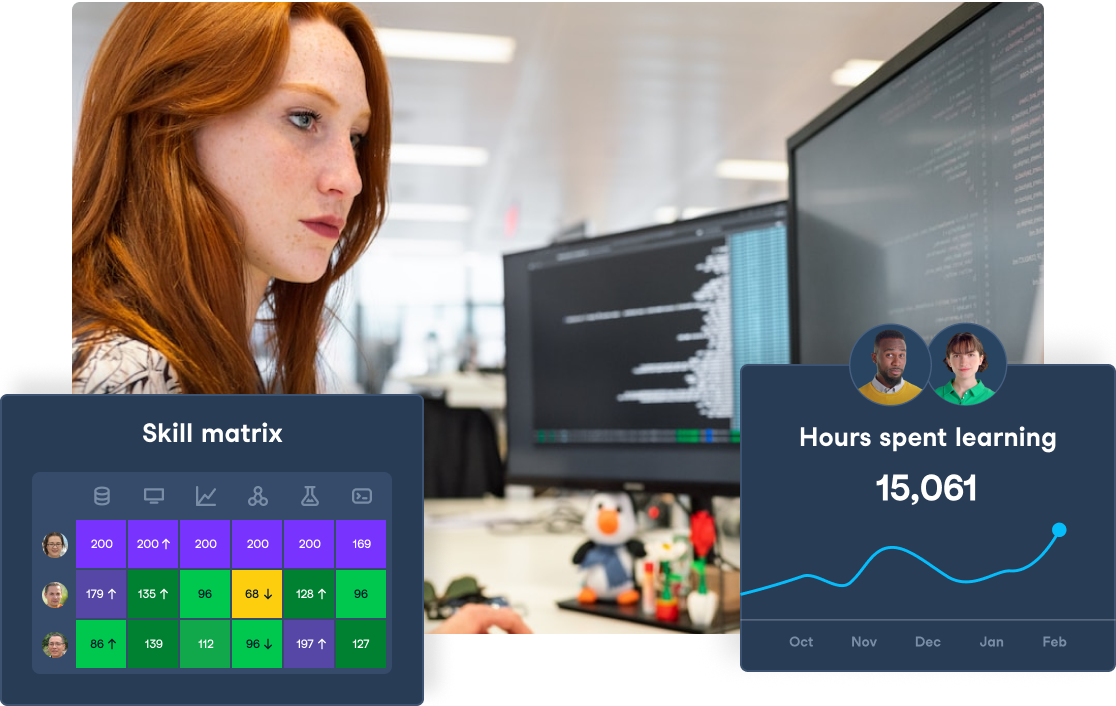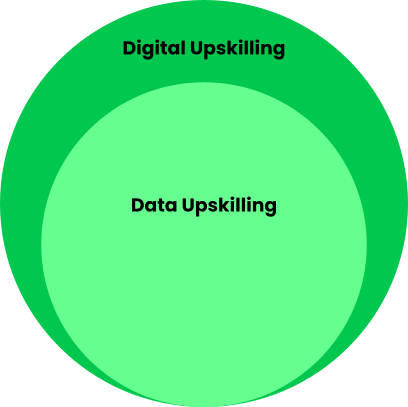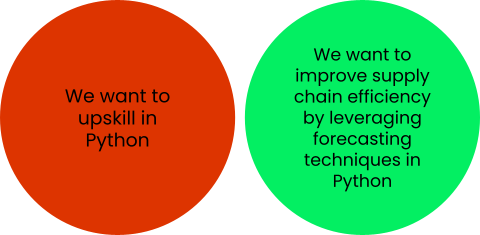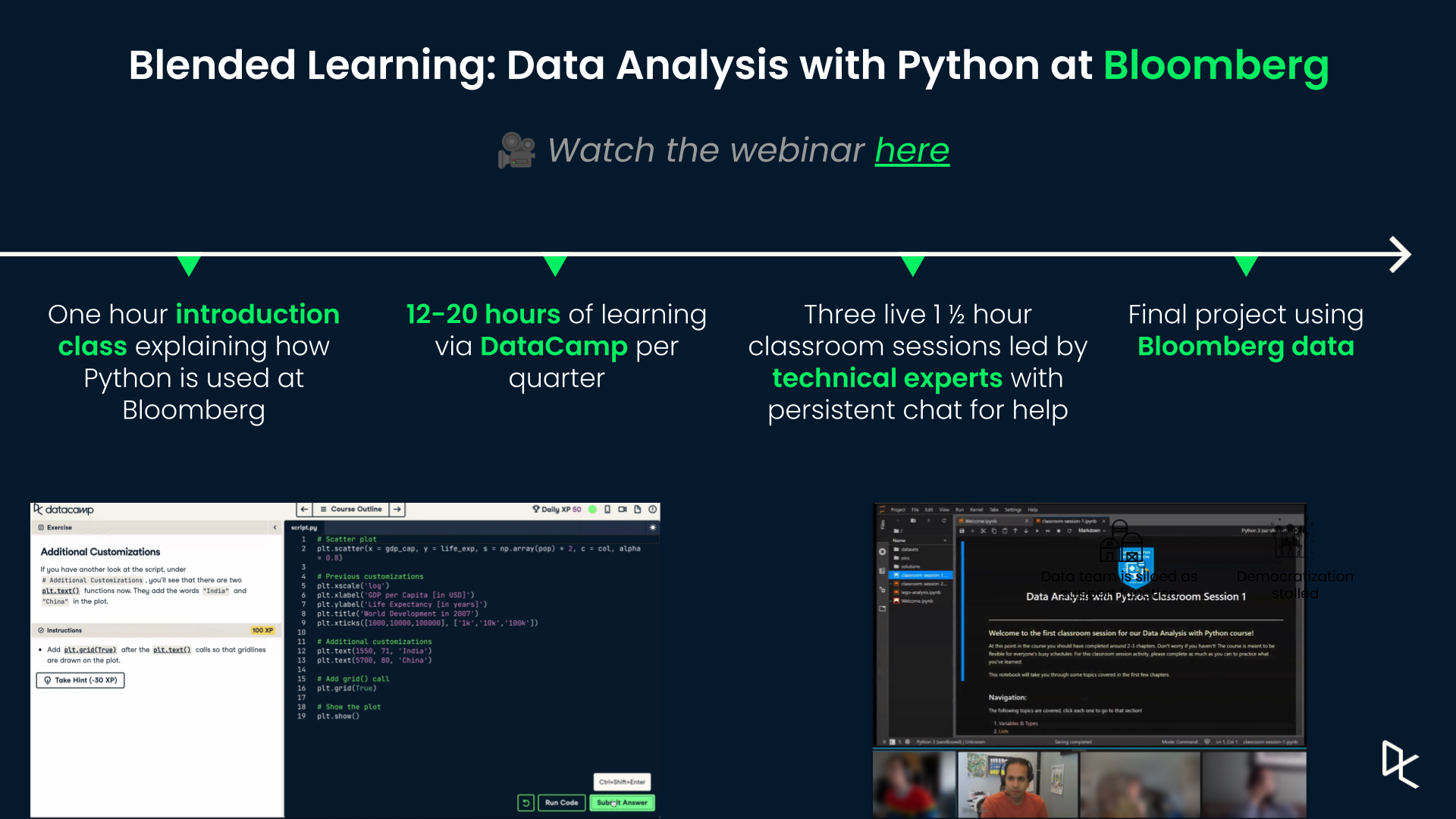According to McKinsey, around 70% of digital transformation projects fail. The success of digital transformation initiatives hinges not just on adopting new technologies but on the people who wield them.
An often-overlooked aspect of these transformations is the human element — the skills and competencies required to navigate this digital frontier effectively. Many digital transformation projects falter or fail outright, not due to a lack of technology or strategy but because of a shortfall in digital proficiency among the workforce.
This fact introduces the critical concept of digital upskilling. In this blog post, we'll explore what digital upskilling entails, why it's essential, and how organizations and individuals can thrive by embracing it. To learn more about building sustainable digital upskilling, check out our webinar on Strategies for Maximizing Data Upskilling Programs.
Empower Your Team with Data Literacy
Enhance your team's data literacy and decision-making capabilities with DataCamp for Business. Access diverse courses, hands-on projects, and centralized insights for teams of 2 or more.

What is Digital Upskilling?
Digital upskilling is the process of expanding and enhancing an individual's digital skills and competencies to meet the evolving demands of the digital era.
It's about equipping employees with the necessary tools, knowledge, and abilities to leverage digital technologies effectively, thus enabling them to contribute more significantly to their organization's digital transformation goals.
This continuous learning journey helps individuals stay relevant in their roles and ensures that organizations remain competitive and innovative in a fast-paced digital world.
Unpacking the Digital Skills Gap
The digital skills gap is a critical challenge for organizations, highlighted by the discrepancy between current workforce capabilities and the digital competencies needed. This gap is not abstract; it's quantified by stark statistics that emphasize the need for action.
In the European Union, 44% of individuals lack basic digital skills, pointing to a significant portion of the workforce unprepared for the digital age. Additionally, 69% of HR professionals acknowledge a digital skills gap within their organizations, reflecting industry-wide recognition of this issue.
The reasons behind the digital skills gap can be attributed to two main causes:
- Organizations have not paid enough attention to the skills component in their transformation projects, opting to focus more on technology innovation & new tool introduction.
- The rate of technological advancements continues to increase, which puts pressure on employees to keep up with the latest skills they need to succeed in their roles.
How the Digital Skills Gap Relates to the Data Skills Gap
The data skills gap is crucial in driving the digital skills divide, underscoring the specific need for data analysis, interpretation, and utilization competencies. In our State of Data Literacy Report, we found that more than half of leaders in the UK and US acknowledge a data skills gap within their organizations that needs urgent attention.
This statistic mirrors the broader digital skills gap, highlighting a critical area where upskilling can significantly impact.

Similar to the digital skills gap, the data skills gap arises from organizations prioritizing technology investment over the development of their people. Jordan Morrow, author of Be Data Literate: The Data Literacy Skills Everyone Needs to Succeed, sheds light on this issue on the DataFramed Podcast.
He explained how the rapid proliferation of data led organizations to invest heavily in technology, often at the expense of building their teams' data literacy. This rush towards acquiring the latest 'shiny toys' has left a gap in practical, hands-on data skills among the workforce.
According to Morrow, this approach has manifested in two main ways: organizations find themselves equipped with cutting-edge technology without the skilled personnel to leverage it effectively, and employees are left trying to catch up with technological advancements without adequate support or training.
The shiny AI and machine learning object can be a part of the roadmap, but it should be further down the line. Instead, organizations should be thinking about good data access and infrastructure, putting data into the hands of the masses, and enabling everyone to find simple insights in the data.
Jordan Morrow, Author of 'Be Data Literate'
The Benefits of Digital Upskilling
Digital upskilling offers a multitude of benefits that extend beyond mere technological proficiency. By investing in digital upskilling, organizations and employees alike can unlock new potentials, drive innovation, and ensure resilience in an ever-changing landscape of work.
How Digital Upskilling Benefits Organizations
Digital upskilling is not just an investment in individual employees; it's an investment in the future of the entire organization. The benefits are multifaceted and can lead to significant transformations in how businesses operate.
Improved Decision Making
With a digitally upskilled workforce, organizations can harness the full power of data analytics and insights. Employees equipped with data literacy and digital skills are better positioned to interpret data, draw meaningful conclusions, and make informed decisions.
This leads to a more strategic approach to business challenges and opportunities, enhancing overall organizational performance. In our State of Data Literacy Report, 65% of leaders pointed to “More accurate decision making” as the main benefit of data upskilling, whereas 51% of leaders pointed to “Faster decision making” as a main benefit.
Increased Agility & Innovation
Digital upskilling fosters an environment of continuous learning and adaptability. As employees become more proficient with digital tools and methodologies, they can more readily embrace change and innovate.
For example, 48% of leaders point to a stronger ability to innovate as the main benefit of digital and data upskilling. This agility is crucial for staying competitive in a fast-paced digital economy, where the ability to pivot and innovate can be the difference between leading the market and falling behind.
Better Customer Experiences
Digitally proficient employees can leverage technology to understand better and anticipate customer needs, personalize interactions, and streamline services. This not only enhances customer satisfaction but also builds loyalty and drives business growth.
How Digital Upskilling Benefits Employees
Digital upskilling is equally beneficial for employees, contributing to their professional growth and satisfaction.
Stronger Employee Engagement & Resilience
Engaging in digital or data upskilling initiatives can boost employee morale and engagement. Learning and applying new skills to meaningful projects can be incredibly rewarding, leading to a more motivated and committed workforce.
Engaged employees are more likely to contribute positively to the organizational culture and its success. For example, according to Qlik, 74% of employees feel overwhelmed by working with data.
Upskilling can help alleviate employee anxiety and improve engagement at work. According to our research, 29% of leaders point to stronger employee engagement as the main benefit of having data-literate employees.
Better Career Outcomes
Digital upskilling opens up new career opportunities and paths for advancement. Employees continuously developing their digital competencies are more likely to progress into greater responsibility and impact roles. This enhances their career satisfaction and contributes to the organization's talent pipeline and leadership development.
A good example here rests with SQL skills. According to Matt Sigelman, president of the Burning Glass Institute, a marketing analyst with SQL skills can make up to 40% more in compensation than a marketing analyst without.
3 Digital Upskilling Best Practices
For digital upskilling to be effective, it must be approached strategically. We’ve worked with thousands of organizations on their digital & data upskilling programs and have condensed the following best practices to help scale your success:
Tie Learning to Transformational Outcomes
Digital upskilling should be closely aligned with the organization's broader business goals. By tying learning objectives to specific business outcomes, organizations can ensure that upskilling efforts directly contribute to strategic priorities.
This alignment not only enhances the relevance and impact of learning programs but also helps quantify their value in business performance.
A common pitfall is developing a skill-based goal like “We want to upskill in Python.” Instead, always consider adding a business objective to your learning goal, such as “We want to improve supply chain efficiency by leveraging forecasting techniques in Python.”

An example of skill-based goals vs transformational goals
Focus on Driving Engagement
Engagement is key to the success of any learning program. Organizations should employ engaging and interactive learning methodologies that resonate with adult learning principles. Gamification, social learning, and real-world projects can enhance engagement, making learning more enjoyable and effective.
Encouraging a culture of continuous learning and celebrating achievements can also drive engagement and participation. A great example of this comes from Specsavers, which leverages DataCamp’s XP & leaderboard system to create engaging upskilling competitions.
Experiment with Different Modalities
Not all learning needs to happen in a classroom. Digital upskilling can take advantage of various modalities, including online courses, microlearning, workshops, and peer learning.
By offering a mix of learning formats, organizations can cater to different learning styles and preferences, making it easier for employees to engage with the content and apply their new skills.
Bloomberg’s blended learning approach offers a good blueprint for this approach, where they combine DataCamp courses & instructor-led sessions as part of their data upskilling program.

Training 2 or more people?
Digital Upskilling Case Studies
Allianz upskilled 6,000 people on data skills
Allianz has long utilized data in its global insurance and asset management services. Its Group Data Analytics team at Allianz SE aimed to promote data literacy across all levels, including HR and Communications.
Allianz partnered with DataCamp to develop a customized learning platform with 22 specific learning paths and three capstone projects based on actual Allianz scenarios.
Starting with a pilot of 100 participants, the program quickly grew to over 6,000 users. It received high praise, with a 4.2/5 average rating, and reported average time savings of 1.9 hours weekly per employee. The program totaled 19,000 hours of practical learning, highlighting Allianz's dedication to data literacy.
CBRE upskilled 2,000+ people on data skills
CBRE, a global leader in commercial real estate, recognized the need to build data literacy to drive efficiencies, enhance client outcomes, and prepare for the industry's rapidly changing landscape. They sought a comprehensive and scalable data upskilling solution for their 2,000+ employees in the UK and Ireland to achieve these goals.
CBRE upskilled over 2,000 staff in data literacy to enhance efficiency, client outcomes, and adapt to the commercial real estate industry's rapid changes. Partnering with DataCamp for Business, CBRE tailored a data literacy program for its UK and Ireland employees, focusing on engagement and personalization. This initiative saved participants 1-2 hours weekly, increased data handling confidence for 81% of employees, and achieved an 88% positive engagement rate.
Upskill your team with DataCamp
In conclusion, digital upskilling is not just a trend; it's a fundamental shift in how organizations approach the development of their most valuable asset: their people. In an era where digital transformation dictates the pace of business evolution, the ability to adapt and grow digital competencies is crucial.
At DataCamp, we’ve worked with 4,000+ organizations, including Allianz, CBRE, Specsavers, Marks & Spencer, Colgate, Google, and more on their data & digital upskilling programs. Speak to our team to learn more about our programs.
Training 2 or more people? Check out our Business solutions
Get your team access to the full DataCamp library, with centralized reporting, assignments, projects and more


